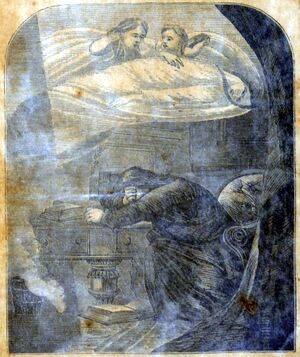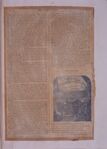< Man as a Spirit; Phenomena as Produced by the Spirits of the Living (continued from page 4-112) >
know the doctrine,* and the most ancient religions, philosophies and experts tell us the same thing. Man they say is a spiritual being, and should have, if in his right place, the control over matter, and they teach that to obtain this control over nature we must, in the first place, obtain a perfect control over ourselves. We must live a severely pure life, and by contemplation, fasting and prayer, develope our spiritual powers. That many in olden times possessed these powers is clearly proved; and that especially in the East there are still many possessed of these powers, is known beyond all question by those who have devoted themselves to the examination of this subject. If any doubt this they must read that masterly book, just published by Madame Blavatsky, Isis Unveiled. The paper I am now reading was composed before I had read a single page of that powerful book. I have as yet only had time to read the first volume, but I have been continually startled by the corroboration it affords of the views I have held on these subjects ever since my late friend, Mr. Dove, opened my mind to the conception of the nature of entrancement, and my brother’s book, The World Dynamical and Immaterial, convinced me that matter is subservient to power or spirit.
In olden times, in the Middle Ages, and in our day, there have existed side by side the white and the black magic, just as in the Bible we have angels of light and of darkness, Both possessed spiritual power over matter, but whereas those who practised white magic did so as a philosophy and religion, and as a means to good ends, those on the other hand, who practised black magic did so merely to obtain power over human beings for the gratification of their own diabolical selfishness.
Even with the best and greatest, the possession of these spiritual powers must subject the possessor to most dangerous temptations, so much so that even of Christ we read that being led by the spirit into the wilderness, and after fasting forty days and forty nights, and no doubt then with intense prayer to God his Father, obtaining divine and miraculous gifts, he was yet tempted of the devil, to convert stones into bread, to cast himself from the pinnacle of the temple, and to aspire to the kingdoms of this earth. This may be regarded as showing the crucial turning point of Christ’s life. But he made no hesitation, replying to the tempter, “Get thee behind me Satan, for it is written, thou shalt worship the Lord thy God, and Him only shalt thou serve.” †
A belief in the capabilities of man’s spirit over matter is profoundly interesting, but how few could thus become spiritualised, and exercise these gifts without danger; for even the angels kept not their first estate, but, as Milton says, by” ambition, that last infirmity of noble minds,” fell. In The Spiritualist, of the 7th of December, there is a most interesting exposition of the views of the Theosophists, by Colonel Olcott, but I regret to find him saying, “We Theosophists of the inner ring adhere to the Oriental religious philosophies, as better guides to happiness than the Christian theology.”
I suppose Colonel Olcott must mean the priestly interpretations of Christ’s doctrines, not the teaching of Christ Himself, because I cannot conceive of a higher religion and morality than that of Christ; for in him there is placed before us a life and an example, by following which we shall reach the truest life which now is, and that which is to come.
As with the Theosophists so Christ teaches the severest self-discipline as necessary to man’s own salvation, ‡ but he as emphatically teaches that to love, and work, and even die for others, if need be, is our highest privilege.§
Selfishness is not only shown to be the essence of all sin, but directly or indirectly the cause of almost all disease, both acute and chronic, and love and unselfishness are shown to be the great cure for sin and most diseases.
The entire unselfishness of Christ was the cause of His entire sinlessness, and the power by which He cured the bodies and souls of men, was the power of unselfish love. Thus u Christ crucified”|| becomes the sublimest philosophy. It signifies “the crucifixion of our affections and lusts which war against the soul.” ¶ It signifies the daily death of the body, necessary to the daily resurrection of the spirit,** and “all who have this faith will purify themselves as Christ was pure;” †† and thus it is that “Love to God and love to man” are the sum and substance of all the law and the prophets, the essence of all religion and of all morality.‡‡
All who beheld Stephen as he, the first Christian martyr, testified to the truth, “saw his face as it had been the face of an angel,”§§ and Jesus Christ “talking with him (as those witnesses) Peter and James and John went up into a mountain, and as he prayed the fashion of his face was changed, and shone as the sun, and his raiment became as light.”|||| And yet this Being, although possessed of all power, for our example submitted to death, and thus by the total abnegation of self, by the renunciation of the devil, by “the crucifixion of those affections and lusts which war against the soul,” became as u Christ crucified, dead in the flesh but alive in the spirit.” ¶¶ And He who spent His life in care and sorrow, and with the perfect foreknowledge of a fearfully cruel death, yet went about continually doing good, healing all manner of diseases, forgiving His enemies, casting out devils, opening the eyes of the physically and spiritually blind, raising the bodily and spiritually dead— first was transfigured, and ultimately, as “Enoch who walked with God,” was carried up into the presence of “His Father and our Father, his God and our God.”***
Having at one and the same time been a dweller on this earth, and an inhabitant of heaven, He thus “the well-beloved Son of God,” and the perfect, divine, and miraculous Son of Man, becomes the Saviour of the world, not by His righteousness being imputed to us as some say, but by our adopting His righteousness, “the way, the truth, and the life” for ever and for evermore. Thus††† it is I conceive that the pure in heart shall see God, and thus it is that God in the centre and in the circumference is the key to man, and Christ to earth and heaven and to universal law.
* John vii. 17.
† Matt. Vi. 10.
‡ Matt x. 38, 39; chap. Xvi. 24, Mark viii. 34, Luke ix. 23; chap. Xiv. 27.
§ John xv. 13.
|| Cor. i. 23.
¶ 1 Peter ii. 11.
** 1 Cor. xv. 31.
†† 1 John iii. 3.
‡‡ Matt xxii. 37; Mark xii. 31; Luke x. 27.
§§ Acts vi. 15.
|||| Matt. Xvii. 2.
¶¶ 1 Peter iii. 18.
*** John xx. 17.
††† John xiv. 6.
The Raven

But the Raven still beguiling all my fancy into smiling, |
Editor's notes

